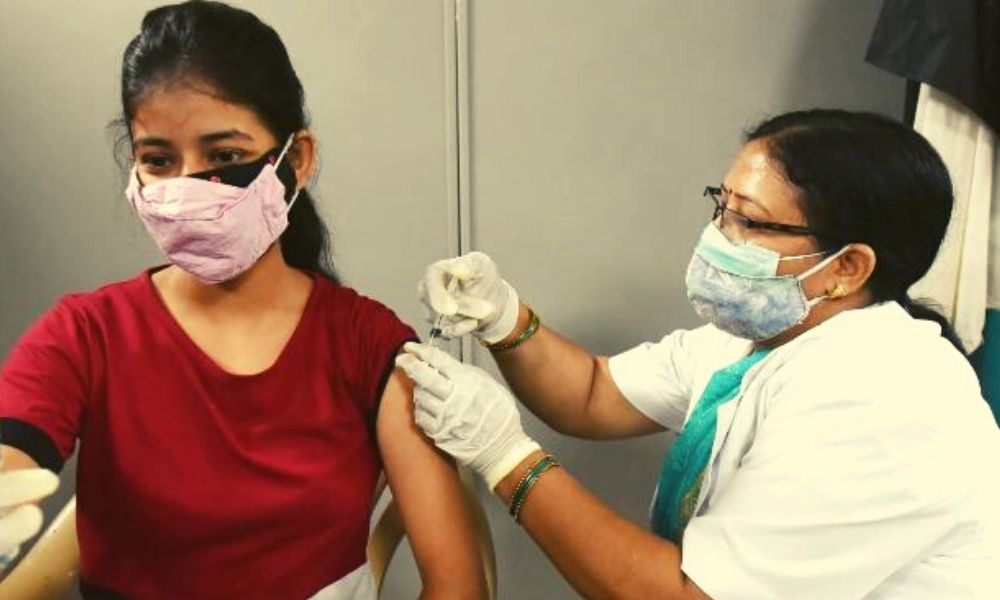
Image Credit: New Indian Express
Didn't Back Doubling Of Covishield Gap, Say Scientists; Government Denies
Writer: Prattusa Mallik
A student of Journalism and Audio-Visual Communication, interested in words and silences alike, I aim to bring the narratives of the periphery to the centre, one story at a time. When not working, I'm usually caught reading, thinking, writing, watching Friends, or stargazing.
Delhi, 16 Jun 2021 2:48 PM GMT | Updated 16 Jun 2021 4:26 PM GMT
Editor : Madhusree Goswami |
A mountain girl trying to make it big in the city. She loves to travel and explore and hence keen on doing on-ground stories. Giving the crux of the matter through her editing skills is her way to pay back the journalism its due credit.
Creatives : Prattusa Mallik
A student of Journalism and Audio-Visual Communication, interested in words and silences alike, I aim to bring the narratives of the periphery to the centre, one story at a time. When not working, I'm usually caught reading, thinking, writing, watching Friends, or stargazing.
Union Health Minister Harsh Vardhan said the decision to increase the gap between two doses of Covishield has been taken in a transparent manner based on scientific data.
The Centre doubled the gap between the two doses of the AstraZeneca (Covishield) vaccine without the agreement of National Technical Advisory Group on Immunisation, three members of the advisory body told Reuters on Tuesday, June 15.
On May 13, the Ministry of Health and Family Welfare announced that the gap between the two vaccine doses would be increased from 6-8 weeks to 12-16 weeks. The gap was said to be recommended by the NTAGI. National Expert Group on Vaccine Administration for Covid (NEGVAC), a group of government officials responsible for vaccine administration, was also claimed to have agreed to it.
Why Was The Gap Increased?
Notably, the decision to increase the gap between doses came when COVID cases were surging, and there was a shortage of vaccines. However, in a news conference on May 15, government health officials stated that the decision was not as a result of vaccine shortage but a purely scientific one.
Further, it said that NTAGI based this recommendation on real-life evidence, primarily from Britain. But now, the NTAGI scientists — classified by the government as three of the 14 core members — have said they did not have enough data to make such a recommendation.
M.D. Gupte, former Director, National Institute of Epidemiology, is one among the three scientists. "Eight to 12 weeks is something we all accepted, 12 to 16 weeks is something the government has come out with," he said. "This may be alright, may not be. We have no information on that," he added. Mathew Varghese, his colleague at NTAGI, made the same claim.
In early May, South Korea released data, stating that one dose of vaccines from AstraZeneca and Pfizer was 86.6 per cent effective in preventing infections among people aged 60 and above.
JP Muliyil, a member of the COVID working group, said that this had increased their confidence in raising the vaccine dosage interval. However, there was no recommendation about 12-18 weeks. "That specific number was not quoted," he said.
Commenting on the same, a NEGVAC official said that they "respect the decisions of the NTAGI and use them for our work (sic.)".
Government Counters Claims
Responding to this, Union Health Minister Harsh Vardhan on Wednesday, June 16, said the decision to increase the gap between two doses of Covishield has been taken in a transparent manner based on scientific data.
Also read: Is Vaccine Hesitancy Plaguing Rural India? Less Than 0.5 % Have Registered
 All section
All section














